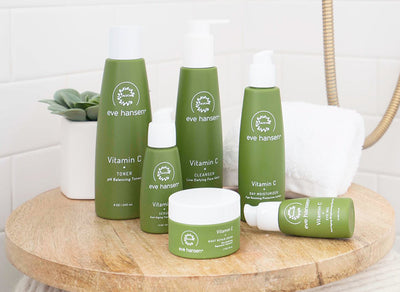
Between leftover Halloween candy and family gatherings for the Holidays, the average person’s sugar intake hits record highs this time of the year. If you’re beginning to notice a congested and dull complexion, you may have a classic case of ‘sugar face’.
Though hard to resist, ingesting mounds of processed sugars could be the main culprit behind a variety of skin concerns. In this blog post, we will be discussing the scary effects of sugar on our skin and the different steps we can take to protect skin from the possible damage it can incur from a sugar overdose!
How does sugar affect our skin?
Sugar Ages Skin
The health and appearance of our skin are extremely vulnerable to the effects of sugar. Sugar can break down our skin’s supply of collagen – the protein that keeps skin plump, youthful and firm. Breaks in our skin’s collagen strands are the root of the appearance of fine lines, wrinkles, and the other visible signs of aging.
Moreover, sugar intake triggers an increase in insulin production, which leads to protein malfunctions and affects the production of the essential proteins and amino acids that build up our natural supply of collagen and elastin – leaving skin saggy and wrinkled. Glycation, the chemical process that causes our skin to age, is stimulated when our insulin levels spike. As we age, the process of glycation naturally occurs but the speed of its occurrence is heavily influenced by our sugar intake. These insulin spikes also cause bodily inflammation, which may cause tissue damage and premature aging.

Sugar flares breakouts
Sugar has shown to exacerbate skin conditions such as acne, inflammation and rosacea. Sugar increases the production of testosterone in our bodies, which hardens blood vessels and widens pores. The spike in insulin caused by too much sugar also contributes to the increase in skin oil production and the clogging of follicles.
Additionally, sugar is a dehydrating agent. An unhealthy intake of this ingredient triggers glands to produce more oil and affects our skin’s ability to properly capture moisture – thus, clogging pores and activating pimple formation. Dehydration in skin will leave one’s complexion dull, flaky, lackluster, and may lead to unwanted dark circles and age spots.
Steps to take:
-
Eliminating simple carbohydrates – such as junk foods and dairy – from your daily diet has proven to have fantastic effects for the skin. Cutting out sugar has shown to produce visible changes in skin appearance from as little as 72 – 96 hours. Skin will look and feel better, will not be too oily or too dry, and dark circles will be less visible.
-
Pay special attention to the glycemic index positioning of the foods you eat as foods that have a lower rank on the index help regulate insulin production. Some options of foods with a lower glycemic index include vegetables or natural sugars including fruit and whole grains.

-
Always keep skin moisturized to combat the dehydration caused by sugar
-
Consume a healthy amount of water to continually flush toxins from the body
Taking an extra piece of Halloween candy or indulging in a pint of rocky road ice cream will not be the downfall to our healthy complexion but making more frequent healthy diet choices will immediately improve skin health. What we consume has a direct effect on our skin and our sweet tooth could be the biggest instigator of the skin conditions we are facing. Cutting out sugar alone won’t solve every skin issue, but it will definitely product visible results. In addition to sugar, inflammation, breakouts, and skin stress are also triggered by other lifestyle choices such as stress and lack of sleep. The key to healthy, glowing skin is finding a healthy balance between our diet, proper self-care regimen and effective skin care products.



